#Rev. Jesse Jackson
Text
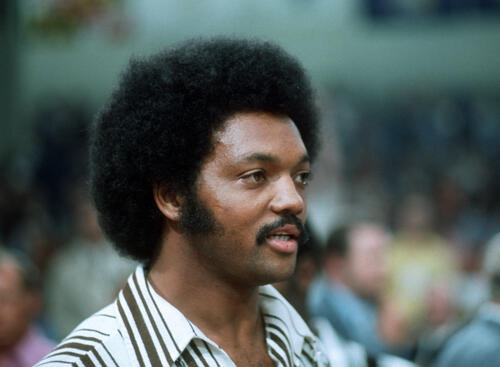
Jesse Jackson photographed by Dennis Brack at the 1972 Democratic National Convention
24 notes
·
View notes
Text
Monster: The Jeffrey Dahmer Story - Ep. 8: "Lionel"
Monster: The Jeffrey Dahmer Story – Ep. 8: “Lionel”
Netflix’s Monster: The Jeffrey Dahmer Story
Ep. 8: “Lionel”
Directed by Gregg Araki
Written by Ian Brennan & David McMillan
* For a recap & review of Ep. 7, click here.
* For a recap & review of Ep. 9, click here.
Lionel Dahmer’s had time alone in the interrogation room to compose himself, then he goes back to speak with the detectives for a moment and asks if he can see his son. He’s brought to…

View On WordPress
#Cannibalism#Ed Gein#Homophobia#Jeffrey Dahmer#Lionel Dahmer#Racism#Rev. Jesse Jackson#Serial Killer
0 notes
Text
Black History is American History - djG
@donnasmusicqkblr
#African American History Month#2024#Tumblr#donnasmusicqk#facebook#deejaniccaG.#youtube#Instagram#djG#iddjG.net#Twitter#PINTEREST#Linked in#SoundCloud#TikTok#Obama#MLKJr.#Rev Jesse Jackson#IndieGospel Artists#Gospel#IndieGospel#God#Lord Jesus#Jesus Christ#Christianity#BET Gospel#Hill City Church Hawthorne#Capella University#NCU#Indiana University
3 notes
·
View notes
Text
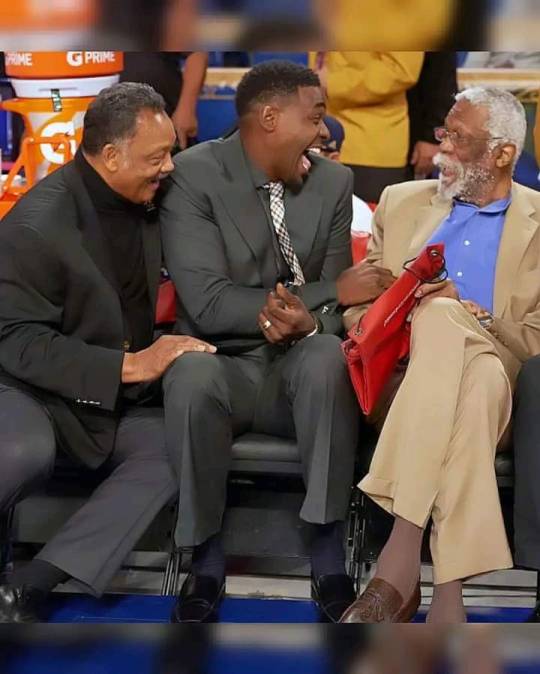
Rev. Jesse Jackson, Chris Webber and Bill Russell sharing laughs at the 2014 NBA All-Star Weekend in New Orleans.
0 notes
Text
The Freemasons Have Inspired Centuries of Conspiracy—This Is Their Real History
The Story of How a Stonemasons’ Guild Became the World's Largest Secret Society is Less about Conspiracy and More About Enlightenment Thinking.
— September 19, 2023 | By Erin Blakemore

The Title Page of the Freemason Constitution at the Museum of Freemasonry in Paris. Freemasonry traces its roots to medieval stonemason guilds, though its modern iteration dates to the 18th century. Photograph By Godong, Universal Images Group/Getty Images
What do Rev. Jesse Jackson, George Washington, Wolfgang Amadeus Mozart, Duke Ellington, and Buzz Aldrin have in common? All are members of the world’s largest secret society, the Freemasons—a group whose members include some of the world’s most influential people and whose secretive rituals have persisted for centuries.
Conspiracy theorists speculate the group pulls the strings of international power and finance and is responsible for high-profile murders—some even claim its members worship Satan.
Where is the line between fact and fiction within this secretive society? Read on to learn more.

18th Century Italian-Austrian Artist Ignaz Unterberger Painted this Initiation Ceremony in a Viennese Masonic Lodge in 1789. Photograph By Deagostini, Getty Images
The Origins of Freemasonry
Though the Freemasonry movement has roots in medieval guilds of stonemasons, the vast majority of the movement’s members are not masters of stonework. It’s believed that as stonemason membership decreased, the group began accepting “speculative,” or honorary, members to bolster their numbers. Freemasonry’s modern incarnation dates to the 18th century Age of Enlightenment, when educated Englishmen aimed to commune with others and discuss issues of philosophy, religion, and life in an organized setting.
Fraternal organizations had existed for centuries, but in the 18th century, a variety of men’s groups named after the English pubs at which they met joined together in what they called a “Grand Lodge,” an association that would meet to hold rituals and ceremonies and induct new members. Now known as the Premier Grand Lodge of England, the group was the first of its kind, and as membership expanded so did its list of secret rituals and ceremonies and its membership requirements.
According to the Masonic Service Association of North America, there were about 898,000 Freemasons in the U.S. as of 2020, and there are an estimated 6 million Freemasons worldwide.
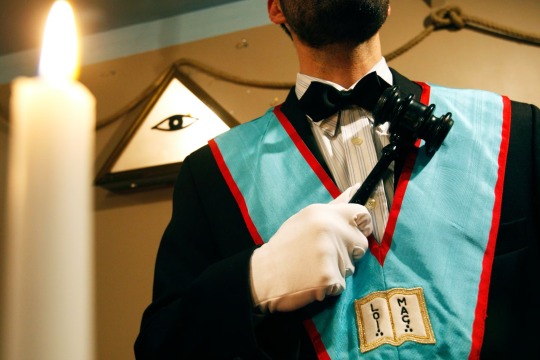

Freemasons hold a Lodge meeting in Bordeaux, France, in 2008. Photographs By Regis Duvignau, Reuters/Redux
Who Can Be a Freemason?
Today, membership requirements are relatively simple: Though each group, or Lodge, of Freemasons has its own rules, in general a Freemason must be a male who is recommended by other members of the Lodge, believe in a “Supreme Being,” be of good moral character, and pledge to learn the ways of the fraternity and conform to what Freemasons call their “ancient uses and customs.”
Those customs include a strict hierarchy and a variety of ceremonies and rituals. After they are initiated into their lodge, members go through a series of “degrees” of membership, rising from Entered Apprentice to Fellowcraft to Master Mason. Along the way, they learn the language, rites, and beliefs of the “craft,” engaging in rituals that harken to Biblical beliefs . They also adopt emblems that range from the square and compass, which represents morality, the beehive, which is said to represent cooperation and work among members, and the “Eye of Providence” or “All-seeing Eye,” which represents God’s eternal watchfulness. Some of these symbols are so well known that they are familiar to non-Masons—for example, the Eye of Providence can be found on U.S. one dollar bills.

The masonic symbols of a square (virtue) and compass (wisdom) are placed atop a Bible, which is open to the Gospel of St. John, during a Freemason ceremony. Photograph By Raquel Clausi Rochina, Cordon Press/Redux
Why Catholicism Forbids Freemasonry
When they’re not holding elaborate membership rituals, Freemasons often engage in community service and philanthropy, provide mutual support to members, or work with associated organizations. But despite this charitable focus and the fact that it is not a formal religion, Freemasonry isn’t universally accepted. In fact, Freemasonry is banned by Roman Catholicism, which forbids Catholics from joining and encourages them to associate with Catholic organizations like the Knights of Columbus instead.
“Their principles have always been considered undesirable by the doctrine of the Church and therefore membership in them remains forbidden,” the Church declared in 1983. “The faithful who enroll in Masonic associations are in a state of grave sin and may not receive Holy Communion.” As Catholic Herald’s Ed Condon explains, the Church opposes Freemasonry because of its secular focus and its role as a sanctuary for “those with heterodox ideas and agendas.”
Power and Panic
Those agendas have long spurred controversy because of the political power wielded by some Freemasons. Though the rules of most lodges discourage members from discussing politics, many of its members are active in political parties and government and the organization’s secrecy and vows of brotherhood have spawned conspiracy theories about its members’ political agendas.
Most conspiracy theories speculate that all Freemasons have the same beliefs and act as a body, tying in with modern anti-Semitic conspiracy theories that associate the group with a shady “New World Order” which controls international finance and relations.

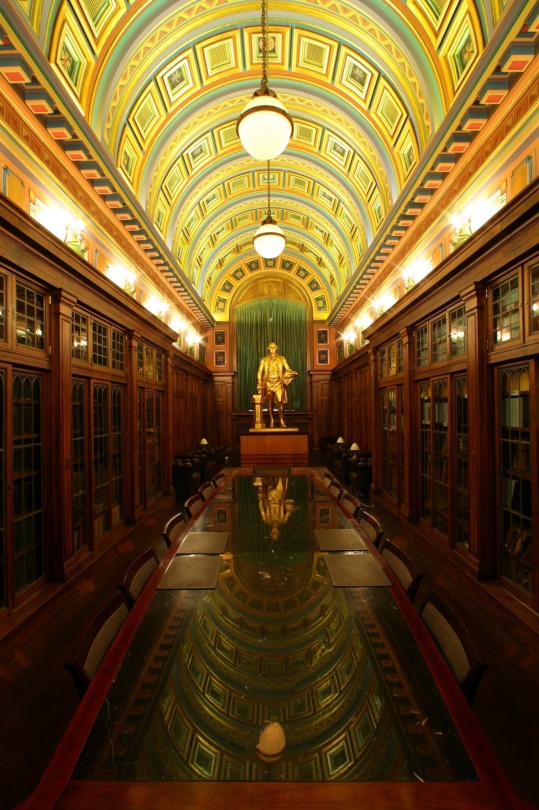
Left: Seats for high-status members are seen in the Freemasons Hall of the United Grand Lodge of England in London. Photograph By Peter Dazeley, Getty Images
Right: A statue of George Washington in a Masonic apron stands inside the New York Grand Lodge Headquarters. Photograph By Fred R. Conrad, The New York Times/Redux
As a result, Freemasonry has become iconic in popular culture and among non-members who are intrigued by its shady rituals. Yet membership has dwindled for years. Why the decline? Some connect it to a larger trend among fraternal organizations and service clubs like the Benevolent and Protective Order of Elks, which have seen steep declines over the decades. Others attribute falling membership to the movement’s refusal to recognize women despite the existence of some all-female lodges.
Or perhaps the fall is due to growing public awareness of the movement’s once-secret rituals, historian John Dickie told NPR in 2020. “I think possibly actually the issue is that secrecy has lost something of its magic," Dickie said. “In an age when it can take two minutes or less on Google to find out what the Freemasons' secrets really are, I'm not sure that they can really hold that much mystique for members anymore.”
Despite controversy and condemnation, the movement persists—but only time can tell whether Freemasonry can remain relevant in the 21st century. Meanwhile, its members say they see Freemasonry as everything from a powerful brotherhood to a chance to give back to the community to what one English member calls “an avenue for personal growth and development.” For now, Freemasonry’s secretive rituals and symbols live on—along with the influence of its best-known members.
#National Geographic#The Freemasons#Conspiracy#Real History#Stonemasons’ Guild#World's Largest Secret Society#Less Conspiracy | Enlightenment#Erin Blakemore#Rev. Jesse Jackson | George Washington | Wolfgang Amadeus Mozart | Duke Ellington | Buzz Aldrin#Origins of Freemasonry#Catholicism Forbids Freemasonry#Power and Panic
1 note
·
View note
Text
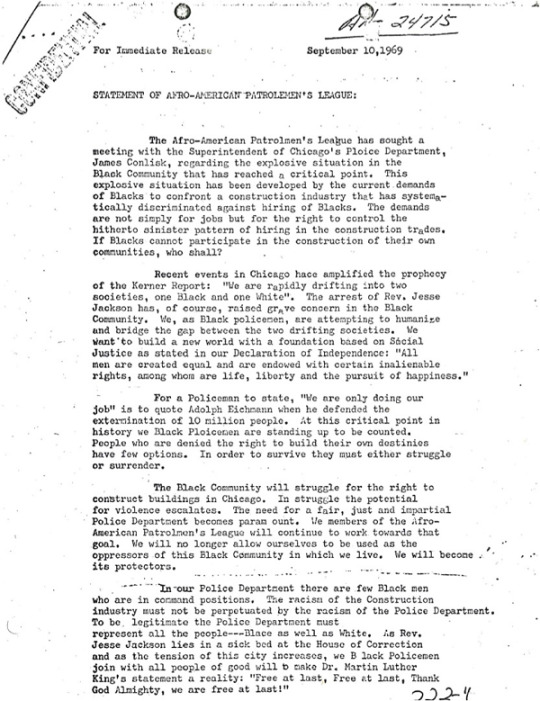
Statement of Afro-American Patrolmen's League
Record Group 21: Records of District Courts of the United StatesSeries: Civil Case FilesFile Unit: Renault Robinson and the Afro American Patrolmen's League v. James B. Conlisk, et al.
Confidential
[illegible] -24715
For Immediate Release
September 10, 1969
The Afro-American Patrolmen's League has sought a meeting with the Superintendent of Chicago's Ploice Department, James Conlisk, regarding the explosive situation in the Black Community that has reached a critical point. This explosive situation has been developed by the current demands of Blacks to confront a construction industry that has systematically discriminated against hiring of Blacks. The demands are not simply for jobs but for the right to control the hitherto sinister pattern of hiring in the construction trades. If Blacks cannot participate in the construction of their own communities, who shall?
Recent events in Chicago hace amplified the prophecy of the Kerner Report: "We are rapidly drifting into two societies, one Black and one White". The arrest of Rev. Jesse Jackson has, of course, raised grave concern in the Black Community. We, as Black policemen, are attempting to humanize and bridge the gap between the two drifting societies. We want to build a new world with a foundation based on Social Justice as stated in our Declaration of Independence: "All men are created equal and are endowed with certain inalienable rights, among whom are life, liberty and the pursuit of happiness."
For a Policeman to state, "We are only doing our job" is to quite Adolph Eichmann when he defended the extermination of 10 million people. At this critical point in history we Black Policemen are standing up to be counted. People who are denied the right to build their own destinies have few options. In order to survive they must either struggle or surrender.
The Black Community will struggle for the right to construct buildings in Chicago. In struggle the potential for violence escalates. The need for a fair, just and impartial Police Department becomes paramount. We members of the Afro-American Patrolmen's League will continue to work towards that goal. We will no longer allow ourselves to be used as the oppressors of this Black Community in which we live. We will become its protectors.
In our Police Department there are few Black men who are in command positions. The racism of the Construction industry must not be perpetuated by the racism of the Police Department. To be legitimate the Police Department must represent all the people--Blace as well as White. As Rev. Jesse Jackson lies in a sick bed at the House of Correction and as the tension of this city increases, we Black Policemen join with all people of good will to make Dr. Marin Luther King's statement a reality: "Free at last, Free at least, Thank God Almighty, we are free at last!"
60 notes
·
View notes
Text

COWBOY ID PACK

NAMES ⌇ abeline. adeline. alfred. anderson. annie. archer. arthur. ash. aspen. austin. automata. axel. barett. beau. beckett. belle. bennett. betty. billy. blaise. boone. bree. brooks. bryce. cade. caleb. callen. callie. calvin. carson. casey. cassidy. chance. chase. clayton. clementine. clint. clyde. cody. colby. cole. colt. colton. connor. coraline. county. cree. cyrus. dagger. dakota. dallas. dalton. damon. darby. darla. delta. denver. dove. east. easton. edgar. eliza. elliot. ellis. emmett. emmylou. everett. everly. fallon. fang. farmer. fletcher. flint. flynn. fritz. gage. georgia. georgina. grant. graves. hank. harrison. harvey. hattie. hawk. hayes. heidi. holster. hudson. hunter. ida. jace. jack. jackie. jackson. james. jed. jesse. jessie. john. jolene. josh. joshua. jude. knox. leroy. lewis. loretta. lucille. luke. luther. lyle. maple. marshall. mason. maverick. meadow. millie. misty. myra. nash. nell. nina. oakley. oscar. otis. owen. pace. pamela. penelope. phoenix. pierce. pollyanna. prairie. quinn. ray. reed. reid. rhett. rhys. riley. river. rochelle. rory. roscoe. rosie. rudy. ryder. rye. sadie. savannah. sawyer. scarlett. sedona. selena. shep. shepherd. sienna. sierra. silas. skye. spanner. sparky. sterling. stevie. stormy sullivan. sundance. tallulah. tate. tess. todd. tucker. twila twyla. verily. wade. walker. walt. walter. waylon. wayne. weston. wilde. will. willa. willow. winona. wren. wyatt. zachariah. zane. zeke. zinnia.

PRONOUNS ⌇ ace/ace. aim/aim. badge/badge. bandana/bandana. barrel/barrel. boot/boot. boy/boy. brash/brash. buck/buck. bull/bullet. cattle/cattle. clad/clad. clash/clash. colt/colt. cow/boy. cow/cow. cowboy/cowboy. cy/cyborg. denim/denim. dirt/dirt. dive/dive. drive/drive. fang/fang. farmer/farmer. fence/fence. fire/fire. foal/foal. gold/golden. gra/grass. gun/gun. hat/hat. herd/herd. hill/hill. hit/hit. hold/holdem. holdem/holdem. hoof/hoof. horse/horse. iron/iron. jack/jack. jump/jump. kick/kick. lasso/lasso. law/law. lawful/lawful. lone/lone. mech/mecha. metal/metal. mount/mountain. mustang/mustang. noon/noon. officer/officer. out/out. outlaw/outlaw. poker/poker. protect/protect. pry/pry. punch/punch. punish/punish. ranch/ranch. ranger/ranger. rev/rev. rev/revolver. rev/rev. revolvers/revolver. river/river. ro/ro. robo/robo. rug/rugged. run/run. rust/rust. ry/ry. save/save. sharp/sharp. sheriff/sheriff. shoot/shoot. shot/shot. shot/shotgun. shout/shout. spark/spark. spur/spur. star/star. steed/steed. steel/steel. sun/sun. thief/thief. tumble/tumble. weed/weed. wheat/wheat. wood/wood. yee/haw. yeehaw/yeehaw.

#⭐️lists#id pack#npt#name suggestions#name ideas#name list#pronoun suggestions#pronoun ideas#pronoun list#neopronouns#nounself#emojiself#western
111 notes
·
View notes
Note
I'm not Black, so I don't want to butt into a community discussion, but I was curious about the popularization of the term African-American.
https://www.nytimes.com/1989/01/31/us/african-american-favored-by-many-of-america-s-blacks.html
This story attributes the promotion of "African-American" to Rev. Jesse Jackson and academia.
My recollection of the time is that the term African-American rapidly became both performative (the way pronoun circles are weaponized today/used instead of anything meaningful) and mocked (used by white racists when they meant the N-word).
Thank you for linking the article! I will say this; based on my current experience of the Black bourgeoisie (or should I say, African American) and who that includes in this article, I can say with 100 percent confidence that they do not always get it right nor do they always make decisions that are best for the community overall 😅. Respectability politics are a dead end and they always have been. One major example of that is how they continue to push for Kamala (and Israel) as "support of the full Black community" despite a strong presence and history of activism for Palestine. BUT THATS A DIFFERENT CONVO.
I'm not saying that African American is a bad term. If you prefer it, use it! I just... prefer Black. Even in this article, it reveals that the reason people went to AA is because there was a negative history behind "Black", and there was a need to "connect with roots". Frankly, saying "African American" is not going to change the way that they'll treat you here, connection to roots or not. They're gonna treat you like that original N word they can't use. They don't care if you're from America, the Caribbean, wherever- they see Black.
Second, they mentioned how Africa offers a place to identify with, and yeah but like... Africa is a continent. Yeah there's Asian American for example, but a lot of Asian-Americans can specifically say where their ancestry is from (Chinese, Korean, Thai, Iraqi, Iranian, Indian, etc.). For me, it reminds me of my past (which I do acknowledge), whereas Black American reminds me of what we built from the ashes. I'm proud of that identity, I'm proud that the people that were all forced here under the worst conditions imaginable found a way to work together and forge a completely new identity through the fire, and continue to do so! Yes I'm African American, but I'm also Black American, and to me, treating it as an insult or "less preferred" only reinforces that white supremacist belief that Blackness is lesser.
There's also Soulaani, I learned!
But yeah I'm not gone argue with anybody about which they prefer and why they like it. I just know that if you asked me what I want to be called, I'm going to say ✨Black✨☺️ and I can still tell when people are nervous using it.
#im also very left leaning and can be considered radical by some so#ask a centrist Black person and theyll probably give you the opposite answer
14 notes
·
View notes
Text
"I have been kept away from my family and only seen them a few times over the past 47 years. It is more than hard, especially when the kids write to me and tell me they want to see me and I cannot afford the cost of travel. If I was free I would build me a home on my tribal land, help build the economy of our nations and give a home to our homeless children,” Peltier said in an interview conducted over email via one of his approved contacts.
Peltier, an enrolled member of the Turtle Mountain Chippewa tribe and of Lakota and Dakota descent, was convicted of murdering two FBI agents during a shootout on the Pine Ridge reservation in South Dakota in June 1975. Peltier was a leader of the American Indian Movement (Aim), an Indigenous civil rights movement founded in Minneapolis that was infiltrated and repressed by the FBI.
The 1977 murder trial – and subsequent parole hearings – were rife with irregularities and due process violations including evidence that the FBI had coerced witnesses, withheld and falsified evidence. Amnesty International, UN experts, Nelson Mandela, the Dalai Lama and the Rev Jesse Jackson are among those to have condemned his prolonged detention as arbitrary and politically motivated and called for his release.
#current events#leonard peltier#biden#native American#acab#indigenous rights#american indian movement#AIM
160 notes
·
View notes
Text
youtube
Today is Super Tuesday. It's more than just presidential primaries.
Last night Rachel Maddow spotlighted some of the wack Republican candidates and wove them together to describe how bizarrely extremist the GOP has become. This is NOT your grandmother's Republican Party which gave us sane people like Gerald Ford or George Pataki.
If you are not taking the threat seriously then you just haven't been paying attention.
Ms. Maddow goes on to say that it's up to us to stop a MAGA Republican takeover of the US. We cannot rely on some legal gimmick to stop Trump.
In the words of civil rights icon Rev. Jesse Jackson: "Nobody will save us from us but us."
#super tuesday#primaries#rachel maddow#maga#republicans#extremism#conspiracy theories#anti-vaxxers#democracy vs. dictatorship#the far right#donald trump#civic involvement#register and vote#vote blue no matter who#election 2024#Youtube
20 notes
·
View notes
Link
Bankole Thompson, one of the nation’s preeminent journalists and a standard-bearer for economic justice, says civil rights leader Rev. Jesse L. Jackson Sr., the president and founder of the Rainbow PUSH Coalition, has been a major force to reckon with in making America a more perfect union and for championing the democratic ideals of freedom and equality, and as such the international statesman should be honored for his contributions at the 2024 Democratic National Convention, taking place Aug. 19- 22 in Chicago.
4 notes
·
View notes
Text
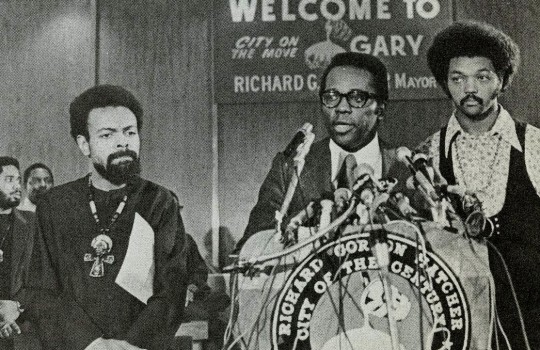
Amiri Baraka, Mayor Richard G. Hatcher, and Rev. Jesse Jackson in Gary, Indiana at the National Black Political Convention (1972)
39 notes
·
View notes
Text

Brenda Lee Eager (August 8, 1947) is a soul singer, songwriter, and musical theatre performer who has written and performed several hits, including “Ain’t Understanding Mellow”, “Close to You”, and “Somebody’s Somebody”.
She was born in Mobile and brought up in the small town of Lower Peach Tree, where she began singing in church as a child. She started writing songs, and by the tenth grade led her vocal group. She first sang professionally at the age of 17 at the King's Club in Prichard, Alabama.
She relocated to Chicago and by 1971 was the lead singer in Jerry Butler’s backup group Peaches. She recorded several singles with Butler, including, “Ain’t Understanding Mellow”, which was her biggest chart success, reaching #3 on the Billboard R&B chart and #21 on the Hot 100. It sold over one million copies and was awarded a gold disc by the RIAA in April 1972. Their duet version of “(They Long to Be) Close to You” reached #6 on the R&B chart and #91 on the pop chart in 1972. She sang regularly in Rev. Jesse Jackson’s Operation Breadbasket Choir in Chicago in the early 1970s.
As a solo singer, she had two minor R&B chart hits, “Good Old Fashioned Lovin’” (Playboy Records, 1975) and “Watch My Body Talk” (Private-I Records, 1984). She worked as a backup singer for such artists as Ray Charles, Mavis Staples, Diana Ross, Stevie Wonder, and Graham Nash. She has written songs recorded by Bobby Womack, the Staples Singers, Aretha Franklin, Cliff Richard, Gladys Knight, Shirley Brown, Prince, and others. She released an album, Startin’ Over, in 2000.
She performed in the musicals The Message is in the Music, alongside Della Reese, and Wild Woman Blues, in Europe with blues singer Maine Weldon. Since 2006, she has directed The Heaven on Earth Choir at the City of Angels Church in Culver City, California. She has written and performed in a one-woman musical theatre show based on her life, Grace, which premiered in Los Angeles in 2010. #africanhistory365 #africanexcellence
1 note
·
View note
Text
Today in Black History
December 16 Negro Methodist Episcopal Church founded in Jackson, TN, 1890 Andrew Young named Ambassador and Chief US Delegate to the United Nations, 1976
December 17
December 18 Congress passed 13th Amendment abolishing slavery, 1865
December 19 Carter G Woodson, historian and father of Black History Month, born 1875-1950
December 20 Mother Matelda Beasley, nun, born 1834-1903 South Carolina secedes from the union, initiating the Civil War, 1860
December 21
December 22 Henry Highland Garnet, abolitionist, born 1815-1882
December 23 Alice H. Parker received a patent for the gas heating furnace, 1919
December 24
December 25 Operation PUSH (People United to Save Humanity) organized by Rev Jesse Jackson, 1971
5 notes
·
View notes
Photo

Seventeen episodes from the groundbreaking African American public radio program PowerPoint are now available for streaming from UMD Special Collections.
The broad range of topics includes civil and human rights, racial reconciliation, education, the arts, media, veterans’ issues, space exploration, political, economic and social issues in Jamaica, the Eritrean-Ethiopian war, Supreme Court cases, and issues affecting Blacks at the state and federal levels.
Guest appearances by Black poets, authors, activists, musicians, actors, athletes, journalists, publishers, playwrights, astronauts, comedians, and political leaders feature an incredible array of perspectives. Among them are such luminaries as Nikki Giovanni, Roger Wilkins, Angela Davis, Rev. Randall T. Osborne, Rev. James T. Meeks, Octavia Butler, Danzy Senna, Dr. Bertice Berry, James E. Clyburn, Samuel J. Chisholm, Jordan “Buck” O’Neil Jr, Will Sutton, Ossie Davis, Ruby Dee, Rep. Sheila Jackson Lee, Rep. Jesse Jackson, Jr., Wayne F. Smith, Tommy Davidson, The Last Poets (Umar Bin Hassan, Abiodun Oyewole, Baba Donn Babatunde), Oscar Brown, Jr., Earl G. Graves, and many others.
23 notes
·
View notes
Text
and can rev. jesse jackson please call us live on our elvis special to tell us if it really is elvis in this photo with him and muhammad ali?
#they share this grainy photo of elvis#and gail claims that ali said it was elvis#but i googled it and find nothing#maybe he said he looked like him#but the guy is literally too tall to be elvis#if you look at photos elvis was shorter and this poor man is taller than ali
3 notes
·
View notes